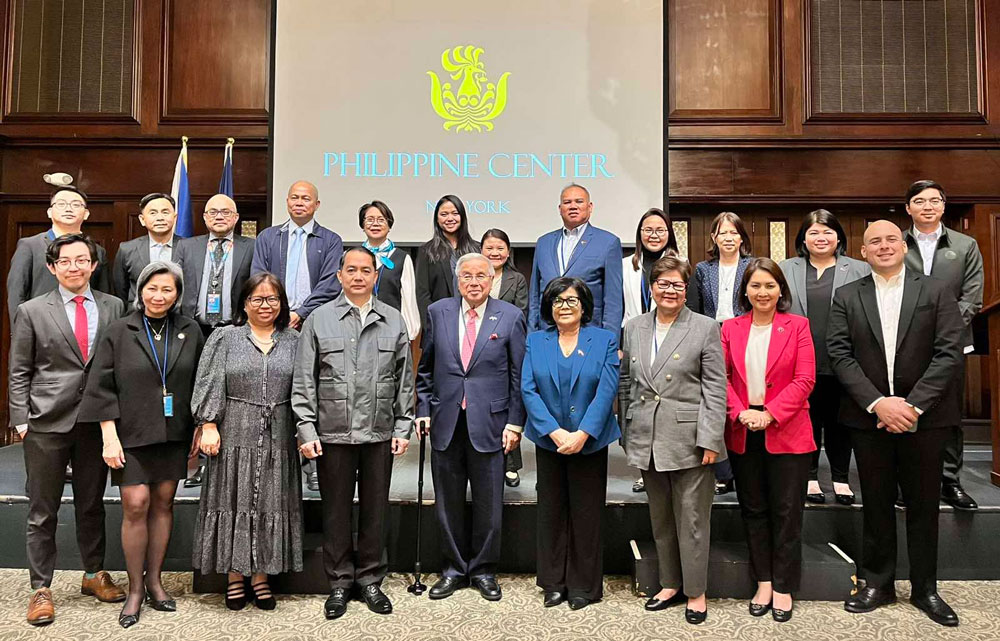
The Philippines reaffirmed its commitment to building resilience especially among the most vulnerable, during the United Nations High-Level Meeting on the Midterm Review of the Sendai Framework for Disaster Risk Reduction in New York on May 18-20.
In its national statement delivered during the plenary meeting convened by the United Nations Office for Disaster Risk Reduction (UNDRR), the Philippines renewed its support for the Sendai Framework, which aims to substantially reduce disaster risk and losses in lives, livelihoods and health over the period 2015-2030. Secretary Antonia Loyzaga was designated by President Ferdinand Romualdez Marcos, Jr. as Head of the Philippine Delegation.
Pursuant to the framework’s objectives, the Philippines committed to implement a comprehensive disaster risk management system that focuses on addressing the needs of all sectors, especially the socially vulnerable groups, amid the twin challenges of climate change and COVID-19.
The Loyzaga-led delegation said the Philippines recognizes the “intersectionality of vulnerability and how interdependencies require systemic solutions across sectors, scales, and geographies” in terms of disaster risk reduction.
The delegation stated how the climate crisis and the pandemic amplified pre-existing social vulnerabilities and overshadowed the country’s achievements in significantly reducing disaster-related mortalities, the number of affected populations, and direct economic losses to GDP prior to 2020.
It further pointed out that majority of all loss and damage between 2010 and 2020 were due to tropical cyclones alone, until COVID-19 came and reversed years of social progress and drove more than three million Filipinos back into poverty.
“These complexities drive our renewed commitment to comprehensive risk management—an all-hazards, whole-of-society nexus approach to climate and disaster governance that is capable of addressing even the needs of fragile, displaced and the most vulnerable communities,” the delegation said.
From 2015 to 2022, resilience strategies were mainstreamed through convergence budgeting and planning and investing in early warning systems, and by prioritizing resilience strategies in the Philippines’ development plans and sustainable finance roadmap.
“We enabled data-driven decision-making and open science through GIS (geographical information system) platforms such as Georisk Philippines and established the Philippine Space Agency,” the Philippine delegation reported.
“Coupled with end-to-end multi-hazard early warning systems and impact-based forecasting, we are able to design new forms of social protection, set engineering standards, and pursue subnational risk financing,” it added.
The establishment of a national natural resources geospatial database, as well as the creation of a Water Resource Management Office and the National Virology Institute, are also seen to support the government’s effort towards a more effective disaster management and response system.
“We continue digital technologies for DRR, while leveraging transdisciplinary science, and local and indigenous knowledge for nature-based solutions,” the delegation said.
As it renewed its commitment to the Sendai Framework, the Philippines called for “effective integration of the framework with agreements on sustainable development goals or SDGs, climate change, biodiversity health, water, and the New Urban Agenda, among others, even as we work for greater access to the financial and technical resources needed to implement synergized programs.”
The Philippines extended the commitment towards a more comprehensive and robust disaster management and emergency response system in a related statement it delivered on behalf of the member states of the Association of Southeast Asian Nations (ASEAN) during the high-level meeting.
ASEAN committed to achieve the targets of the Sendai Framework through: mainstreaming DRR within and across all sectors; focusing on communities and enhancing their capacities on disaster risk management and resilience-building efforts; and for further cooperation between regional and global mechanisms, such as the ASEAN-UN Joint Strategic Plan of Action on Disaster Management.
The New York meeting is seen as a fittiatural Resources, in partnership with the Department of National Defense, will lead the country’s hosting of the biennial APMCDRR, the world’s largest conference on DRR which serves as the main regional platform for promoting coordination, cooperation, and accelerating DRR strategies in the Asia-Pacific.
Convened by UNDRR, the APMCDRR brings together UN member states, intergovernmental organizations, international and national organizations, and stakeholder groups, to accelerate progress on DRR. #












